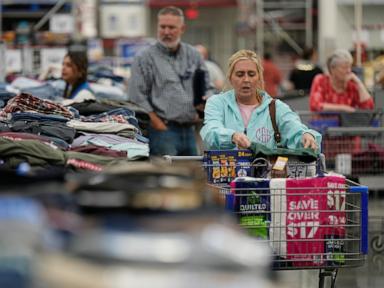Trump Claims Inflation ‘Defeated’ as Fed Cuts Rates Amid Risks

UPDATE: President Donald Trump declared that inflation has been “defeated” as the Federal Reserve cut interest rates for the first time this year, despite the alarming rise in inflation rates over recent months. Speaking at the United Nations General Assembly last month, Trump asserted, “Grocery prices are down, mortgage rates are down,” a statement that contrasts starkly with economic data showing a 2.9% increase in consumer prices in August compared to last year.
This announcement is particularly significant as many Americans continue to struggle with high prices, which remain above the Fed’s target of 2%. The latest inflation report is expected to be delayed due to the ongoing government shutdown, adding to uncertainty surrounding the economy.
The Federal Reserve, led by Chair Jerome Powell, has acknowledged that inflation is still elevated, yet chose to cut its key interest rate. This decision raises concerns about the Fed’s credibility and the potential for a loss of public confidence in its ability to manage inflation effectively. If inflation continues to rise or fails to decrease, it could jeopardize the Fed’s efforts to stabilize the economy.
Economists are apprehensive about the implications of Trump’s tariffs, which have increased costs for many imported goods. For example, consumer prices for groceries surged by 2.7% in August, marking the largest increase since 2015, while coffee prices have skyrocketed nearly 21% over the past year, partially due to a 50% import tax on Brazilian coffee.
According to Karen Dynan, a senior fellow at the Peterson Institute for International Economics, the Fed’s decision to cut rates could be viewed as a miscalculation if inflation does not stabilize. “With memories of pandemic-era inflation still fresh,” she warns, “consumers and businesses could start to lose confidence that inflation will stay low.”
The economic landscape is further complicated by new tariffs imposed by Trump on various products, including 100% on pharmaceuticals and 50% on kitchen cabinets. These tariffs could lead to prolonged inflationary pressures as companies are forced to pass increased costs onto consumers.
In response to these pressures, companies like National Tree Company have announced price increases of about 10% this holiday season to offset tariff costs, while Campbell Soup has indicated that higher expenses for cans will lead to price adjustments. This trend of rising prices could pose a significant challenge for consumers already grappling with financial burdens.
Federal Reserve officials, including Jeffrey Schmid, president of the Kansas City Fed, emphasize the importance of maintaining the central bank’s credibility in managing inflation. “High inflation that results from a loss of confidence in the central bank is harder to fight than other price spikes,” he cautioned.
Despite ongoing concerns, some Fed officials believe that trends such as a slowdown in rental costs could help mitigate inflation in the coming months. However, the overall sentiment remains cautious as the risks associated with tariffs and consumer pricing strategies continue to evolve.
As this situation develops, all eyes will be on the upcoming inflation report and how it will impact the Fed’s policies moving forward. The stakes are high, and the economic well-being of many Americans hangs in the balance.






